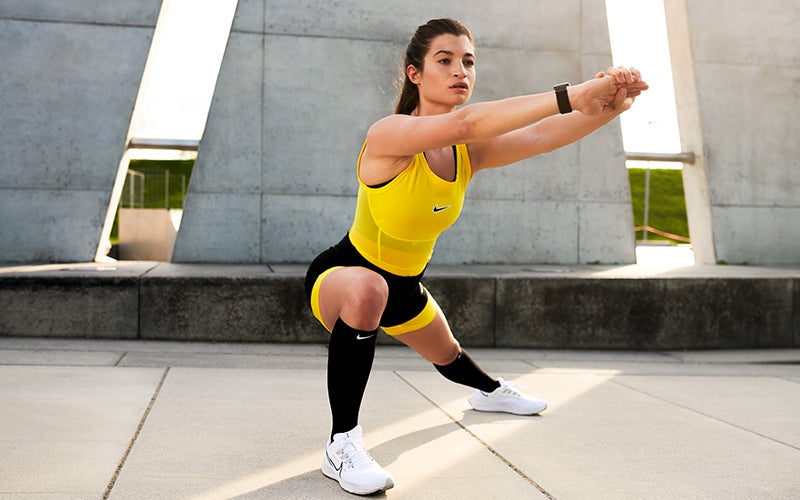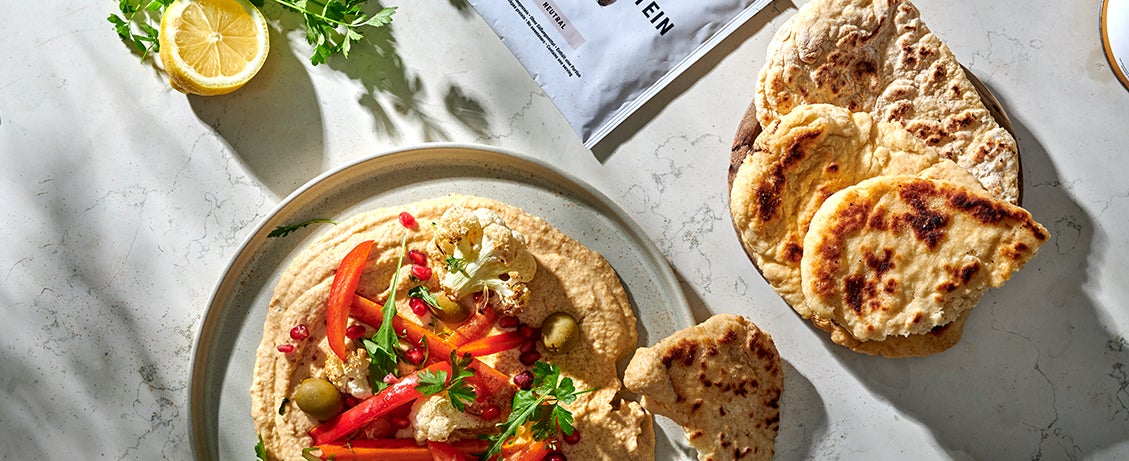Explosive, powerful, and fast – Interview with all-rounder Andi
 © foodspring
© foodspring
Nobody knows how to get motivated quite like @the_andi_g. In this interview, the Nike running coach tells us all about her athletic background, how she stays focused and inspired, and what she does on her own time. Let’s just say, her talents extend way beyond sports.
Let’s get to know her.
Tell us about…
…your athletic background.
I am a classically trained pentathlete. A pentathlon consists of five different sports: running, swimming, shooting, fencing, and horseback riding. Participating in such a diverse array of sports has enabled me to learn new movements and techniques very quickly, even to this day.
…your philosophy of life.
Don’t stop moving! By that I don’t mean that you should train intensively all the time or be constantly making a huge effort. But regular physical activities will also keep you mentally flexible and limber.
…your hobbies outside of sports.
I finished my bachelor’s degree in automotive engineering earlier this year and will be applying for a master’s in medical engineering. I’m interested in technology, innovations, and how things work; learning about this kind of stuff is definitely a hobby of mine.
I also really enjoy cooking and eating and love to experiment with new dishes, whether I’m making them myself or trying them at a restaurant. I also love to go dancing and partying and I feel at ease in Berlin’s clubs. I look forward to their reopening.
Are you a foodie like Andi? Our fitness recipe database is full of recipes you’re sure to love.

…your favorite food.
For the past two years, I haven’t been able to get enough of Chinese food from Sichuan province. I especially love traditional and authentic noodle dishes, as well as anything spiced with Sichuan peppercorns!
Give us three facts that we should know about you.
- My name is Andi, I’m 23, and I moved to Berlin from Macedonia when I was 4 years old.
- I can’t stand to sit still and do nothing. I always need to be moving around, doing things, and taking on new challenges. But right now, I’m trying to take a break one or two days a week. If I don’t force myself to stop working and just relax, I tend to overdo it quickly and reach my limits.
- I am a very impatient person and I want it all, preferably right away. On the one hand, this has allowed me to go very far, but on the other hand, it is often a hindrance because I can’t wait.
You are very active both privately and professionally. How did you get into sports?
I started my sports career at the age of 5 with swimming. Not long after, I began competing and that’s when I got hooked. Unfortunately, I wasn’t in the best shape and my endurance abilities weren’t strong enough to join the club’s main team. That’s when I discovered the modern pentathlon. I like that it jumps between disciplines and forces me to change my movement patterns and skills. At the age of 10, I switched to this sport full time and went on to compete with the national team until I was 17. I had an incredibly fast-paced training program and worked six to seven days a week for several hours at a time.
I had to stop for a while because of an injury, and I eased back into my practice with running. During this period I also discovered weight training and boxing and the benefits the extra strength training gave me. Good strength training is simply the foundation of everything. It’s not all about lifting the heaviest weights, but rather moving in a healthy and strong way that can benefit me in and outside of sports.
On your Instagram account, you can be seen running, lifting weights, and boxing. What does your workout routine look like in general?
I form my workout routine intuitively! Normally, I follow a set training program to get me ready for competitions and competitions, but that’s not what I’m doing right now. I focus on training in a way that makes me feel good afterwards. I usually do two runs a week with one that’s more.
I also do strength training 2-3 times a week and often combine it with a boxing session. I do my strength training sessions with the goal of building or maintaining muscle in mind. With so many workouts, I always make sure to take rest days so I have plenty of time to recover.
What are your mid and long term sport goals?
Long term, I just want to be healthy and fit and feel good when I train. I was barely able to train for months because I had a lot going on with my studies on the side. Since then, I’ve been trying to get back into exercise by building a base of strength and endurance. When it comes to my athletic goals, I always set myself small objectives that I can achieve in just a few weeks.. Right now, I want to become as fast as I used to be at running, especially short distances up to 5K. I also want to get back into boxing, and improve and speed up my footwork. Then, in the winter, I will turn my attention to weight training and running longer distances.
How important is your nutrition? Do you follow a certain diet?
My diet is of course very important to what I do because I enjoy food and need it to keep me going. However, I don’t follow a specific diet. In the last few years, I have learned to eat intuitively and listen to my body to know what it needs at that moment just as I have with training. I’m originally from Macedonia and from a young age I was taught the importance of eating healthy but hearty meals. My grandmother always says that a meal is healthy if there are at least five colors on the plate. I think subconsciously that’s the diet I follow!
For us at foodspring, balance is a priority when it comes to nutrition. How do you balance your diet with your goals?
Sometimes I’ll eat a whole jar of marshmallow cream without thinking twice. I also enjoy eating good meat, especially tartare. I also sometimes like to party until the wee hours of the morning, but I don’t feel guilty about it. At the end of the day, it’s not just about living the healthiest way possible, it’s about living the happiest way possible and enjoying it. If you manage to live a balanced lifestyle or be happy, you shouldn’t be ashamed of it either!
What pre- and post-workout drinks or snacks could you not live without?
I love coconut water, especially during and after very intense sessions. A lot of the time I also eat a whole bar of chocolate right after I run. It’s kind of a weird craving I always get. I also drink protein shakes from time to time, especially on weeks when I’m working out a lot and on the road and don’t have time to eat a balanced meal every day. Right now, my favorite shake is a mix of protein powder, banana, peanut butter, oats, and rice milk. It’s a very effective liquid breakfast when I don’t have time to eat in the morning.
When Andi is in a hurry, she opts for energy shakes filled with good ingredients. For a nutritious drink that tastes like a dessert, try our fudgy vegan chocolate-hazelnut shake with caramel topping.

Your Instagram feed is super inspiring and motivating. Do you ever run out of motivation and what helps you get it back?
When my motivation drops, I always take a moment to get some coffee and fresh air. Another thing that helps is making an appointment or date with someone at the gym, because then I have a commitment that drives me to go. If I don’t feel like it at all or I’m just tired, that’s okay too. In these cases, I’ll just skip a session.
What was your biggest athletic failure and how did you overcome it?
It was in 2013 and I was 15 years old and at my peak athletic performance. I had qualified for the European and World Championship and was just starting to prepare when I suddenly got swollen lymph nodes. I went to see my doctor, who told me that I had mononucleosis. It’s really dangerous, especially for competitive athletes, because a side effect is that making an extra effort can cause the liver and spleen to swell. I had to stop training immediately and tell my teammates they’d have to find someone else to play at the World Cup.
I was bedridden for several weeks and struggled with chronic fatigue syndrome for months. Just going to the kitchen was incredibly exhausting, and that also exhausted me mentally. As someone who was used to 20 hours of training a week, it was difficult to stop. Gradually, I recovered physically, but it was a close friend that dragged me out of my hole by wandering the streets of Berlin with me. He showed me that there are other great things outside of competitive sports. Seven months later when I started training again, I was completely out of practice and basically had to start from scratch. In fact, I couldn’t train nearly as much as I used to without getting injured and had to quit competitive sports completely in 2015. Sometimes I still think about where my sports career would have gone if I hadn’t gotten sick. But I’m really happy with my life and this setback made me the resilient, mentally strong person I am today.
Family, running partners, colleagues, …who supports you the most?
Each and every one of my close friends and family members supports me in their own way. I go running with a colleague who’s faster than me to push myself to go further. My family is my biggest help and refuge when I need advice, moral support, or just peace and quiet!
Do you train with friends often? What do you like most about working out with other people?
Yes, I definitely enjoy exercising one on one with friends and even in groups. A lot of my friends are trainers, too! So we train together, motivate, and learn from each other all at once. In addition to passing along new techniques and methods, we spend a lot of time debating certain exercise philosophies.
You co-founded the Sisterhood of Running network. Can you briefly explain what it’s all about?
The goal of the project was to connect women runners in Berlin to establish an exchange and gather enough people for a half-marathon. On the field, you often see many men runners motivating and pushing each other to do better, but far fewer groups of women, even though there are many women that run. We also developed a discourse to discuss topics that are specific to women who run, like running at night and on your period. Each week, I speak with women from different running communities who share their thoughts. It’s always very interesting to see which topics are of particular concern to different communities.
How important is being part of a community?
I think being able to have an exchange is very important. You don’t have to have a plan for everything, but you have to be open to new things and be able to change your mind sometimes. Being part of a community creates a space for everyone to share their thoughts and opinions. It’s also nice to hear that many people have the same problems and concerns as you. For example, many women wonder if and how they can adjust their running training to accommodate their cycle. Seeing that they are not alone in these questions has not only destigmatized the topic, but also allowed for a more open exchange.

And this highlights how valuable I think it is to be part of a community. Of course, there is also the fact that getting pumped for exercise is much better with a team.
What do you think makes a team strong?
Acceptance, diversity, common interests, encouragement, criticism and being able to celebrate together!
If you want to continue following Andi’s journey, don’t forget to visit her on Instagram
Sources for this article
We at foodspring use only high-quality sources, including peer-reviewed studies, to support the facts within our articles. Read our editorial policy to learn more about how we fact-check and keep our content accurate, reliable, and trustworthy.



















